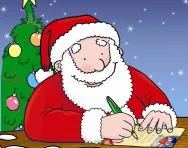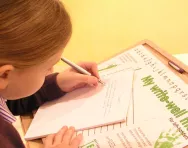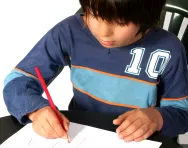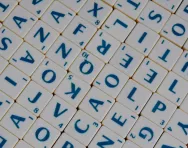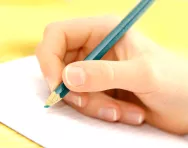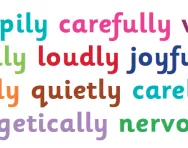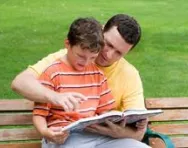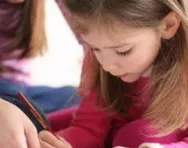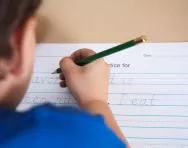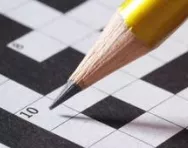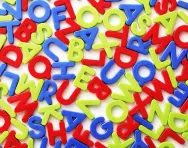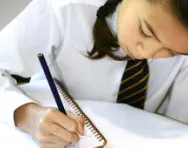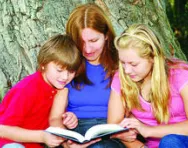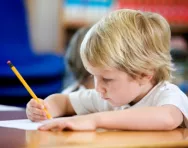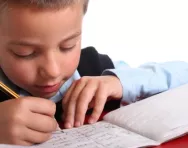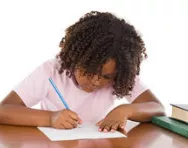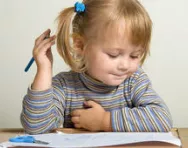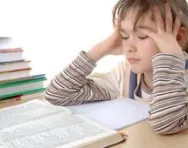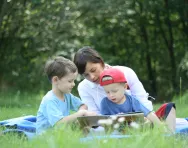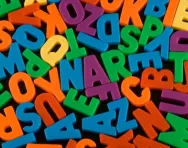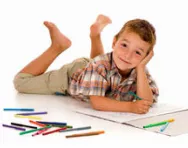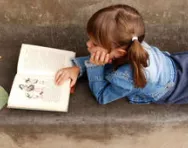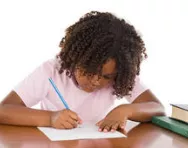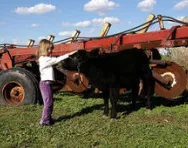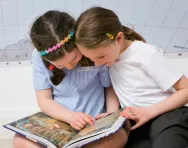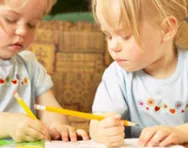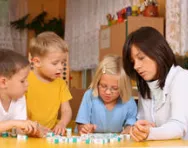Handwriting practice: writing to Santa
It’s the handwriting activity your child will be clamouring to start: writing to Father Christmas! Gather your child’s paper and pencils and settle down to compile the list, then organise a response from the big man himself, as well as a personalised Christmas message.
Handwriting: how your child learns to write
Ever wondered how your child really learns to write? Phoebe Doyle gets expert advice on the best ways to promote good handwriting techniques with your child.
9 fun writing projects to boost literacy skills
Stories aren’t just for reading – teachers regularly use a story as a starting point to engage children in many writing activities that cover a wide range of objectives. Here, education writer Phoebe Doyle gives you a few suggestions for doing the same at home.
5 unusual ways to help with spelling
Help your children improve their spelling skills with games and activities that build word-savviness in fun and interesting ways.
All about dysgraphia
Could your child’s difficulty with writing be dysgraphia? Find out what the signs are, and what to do about it.
What are adverbs?
Use our quick guide to adverbs to help your child understand this descriptive part of speech.
10 steps to better handwriting
From confiding in a diary to writing requests for treats, these everyday strategies will help your child improve their handwriting at home.
5 ways to boost your early reader's confidence
Your early reader may be steaming ahead but you can give them an extra boost with a few easy strategies, says Jackie Cosh. Start today!
Develop your child's literacy skills in the early years
Supporting kids’ literacy skills at home is a key factor in helping them to become accomplished readers with broad vocabularies. Get started today!
Helping your child learn to write
More often than not, parents provide children with their first writing experiences. Here’s how to encourage good handwriting habits from the beginning of primary school.
Writing practice: how to help your struggling child
Is your child’s handwriting a cause for concern? Help them to improve it with these simple activities.
Expert spelling tips for KS1 and KS2
Tutor and author of the best-selling Spelling Made Magic, Clare Winstanley, shares her practical tips and clever tricks to make spelling practice fun for KS1 and KS2 children.
9 spelling strategies from real parents
Helping your child master spelling starts in Reception and continues throughout the primary years. Lucy Dimbylow asked real parents for their top tips on making learning spellings fun.
Top 5 grammar mistakes sorted
Are you confident in helping your child to master grammar? Jackie Cosh explains the basic rules you need to know.
Good grammar made easy
Good grammar isn't just for English lessons – it's a vital skill that will take your child through their educational journey and their life. It's not hard once you know the rules, says Jackie Cosh.
Film-making and animation fun for children
How can you stimulate your primary-school child's interest in literacy and storytelling? From script-writing to editing, these hands-on movie-making activities are perfect for older children to have a go at. You might even help inspire the next Danny Boyle!
What your child learns in Key Stage 1 English
Your guide to what your child will learn in Years 1 and 2 in English and literacy.
Year 2 English: what your child learns
Are you keen to keep up with what your child is learning in English lessons? You can, with this guide to classes in Year 2.
Apostrophes – get them right every time
Apostrophes are tricky things. Do they imply ownership or are they there to denote a missing letter? Do they go before the ‘s’ or after? Jackie Cosh explains how to help your child master them.
Five steps to success in developing your child’s handwriting
In a world where technology is rapidly taking over, teaching children handwriting skills is still as important as it ever was. Best-selling author Bernadette Tynan offers five steps to handwriting success.
Handwriting practice makes perfect
Why is handwriting practice so important, and how can you help your child to learn? Find out in our guide.
Homework tips for children with dyslexia
The British Dyslexia Association shares tips to help make doing homework a calm and productive process for your dyslexic child.
9 ways to help your child love poetry
Use National Poetry Day as an excuse to enjoy the creative wordplay that poetry can offer! Coax out the budding poet in your child with these games and activities, and boost their literacy skills the fun way.
Roald Dahl Day: five ways to celebrate
While there’s always a reason to enjoy and celebrate the amazing books that Roald Dahl wrote, make a special effort on Roald Dahl Day to organise phizz-whizzingly brilliant activities and scrumdiddlyumptious treats!
Using story books to learn to read
Are Kipper, Chip and co the only fictional characters your child is reading about now that they're learning to read? Education writer Phoebe Doyle argues that every book's a reading book, and children's literature is as vital as reading scheme books when it comes to learning to read.
What are high frequency words?
As your child learns to read and spell they’re likely to bring home lists of words. Moira Holden looks at ways in which you can reinforce the learning of high frequency words at home.
Childhood dyspraxia explained
Your guide to what dyspraxia is and how you can support a dyspraxic child at home.
How to strengthen your child's coordination skills
Handwriting, buttoning, drawing or using a knife and fork… your child’s hands can perform the most amazing array of tasks. We take a look at how you can support the development of your child's movement skills.
Dyslexia: strengths, advantages and opportunities
While dyslexic children can have learning difficulties they can also be very gifted in certain areas. Find out how to create a positive and constructive learning experience for your dyslexic child with our top advice.
Reading outside the book
For many children, reading is something they only associate with books. But beyond the page lies a world of words just waiting to be read. Here’s how you can strengthen children's reading skills every day.
Inspire your child to write poetry
Encouraging your child to pick up a pen and try writing some poetry can help them become more emotionally literate and improve their confidence. We have some top children's poetry tips.
Learning English and maths outdoors
The great outdoors is a place where learning can take diverse shapes and forms. We take a look at how you can use it to strengthen your child’s literacy and numeracy skills.
Why it’s important to make time for reading
Reading with your child is a valuable part of their learning, and your relationship, but how do you make the time in busy family life?
How to tell your child a story – without a book
Once upon a time, before the onslaught of video games, DVDs and the internet, telling stories was one of the only forms of entertainment. Jasmin Qureshi looks at how it can still be beneficial (and great fun!) today.
Top tips to help your dyslexic child enjoy reading
Reading might be difficult for some dyslexic children, but that doesn’t mean they can’t enjoy it. We have tips to help you inspire them to love books.
How storytelling can boost learning
As a tool for developing speaking skills, literacy and bonding between parent and child, storytelling is unsurpassed. Phoebe Doyle investigates why it’s so beneficial.
Learning literacy at home
The everyday world provides a wealth of learning opportunities to get your child using their literacy skills outside school. Try these top tips to get your child writing and reading at home.
SATs advice: spelling strategies
During their time in primary school children learn to spell words accurately by a combination of approaches. Help boost your child's spelling confidence for SATs success with our strategies and suggestions.
